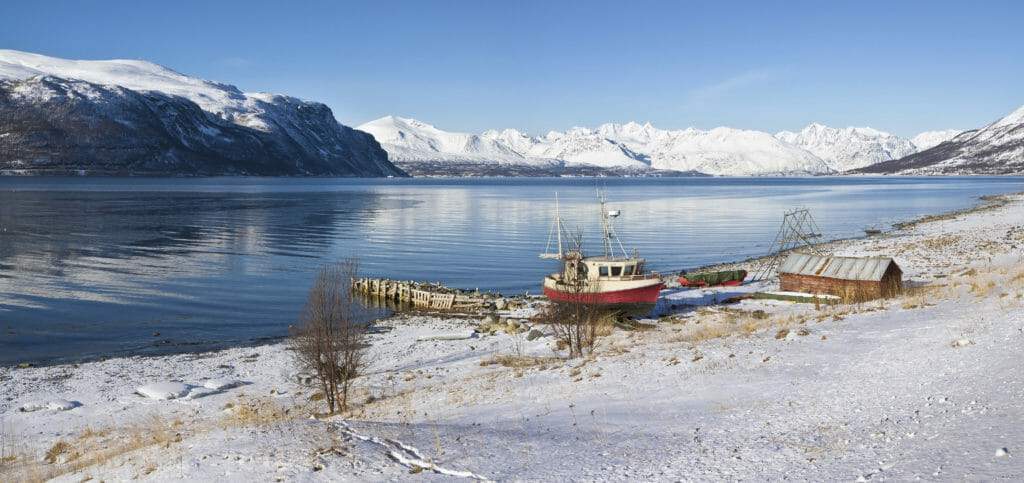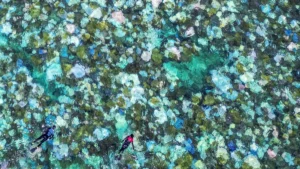Scientists Puzzle Over Changes in the North Atlantic
New studies say that what affects the ocean's circulation may not be driven by man-made climate change—it may be responding to a long-term natural climate cycle. Kåfjorden, Norway, is warmed by the Gulf Stream. (Ximonic (Simo Räsänen) / Wikimedia Commons)
Kåfjorden, Norway, is warmed by the Gulf Stream. (Ximonic (Simo Räsänen) / Wikimedia Commons)
The world can breathe again. Europe can relax: the glaciers will not return. The North Atlantic circulation may resume its former pace and the Gulf Stream slowdown could be coming to an end.
But that may not be entirely good news. Global warming could also be about to accelerate, according to new research into one of oceanography’s most enigmatic phenomena, the North Atlantic Meridional Overturning Circulation.
New studies of all the data so far by an ocean scientist and a mathematician say that what affects North Atlantic circulation may not be driven by man-made climate change. The ocean may be responding to a very long-term natural climate cycle.
At the heart of the puzzle is a simple fact. The flow of warm water from the tropical Atlantic right up to the coast of northern Norway has a dramatic impact on western Europe’s climate. This means that the United Kingdom, France, and other nations are conspicuously warmer than they might be if latitude was the only factor.
A former UK chief scientist once calculated that the Gulf Stream contributed 27,000 times the warmth generated by all the UK’s power stations. But theorists argued that as the Arctic region warmed, the rate of flow could diminish, and paradoxically throw Europe into a new little Ice Age. A 2004 Hollywood disaster movie called The Day After Tomorrow followed this logic, with Britain frozen and glaciers cascading south into the US.
In fact, no such calamitous and sudden return of the intense and lethal cold could happen, but researchers have since then consistently observed a pattern of slowing in the North Atlantic circulation, linked such slowdowns to global warming driven by profligate use of fossil fuels that enrich the levels of greenhouse gases in the atmosphere, and repeatedly warned that the consequences could be costly or even devastating.
But a new study of the data available exposes other possibilities. In the first place, climate scientists have direct measurements of the circulation strength only from 2004, and the decline measured since then has been 10 times more than anyone expected. Perhaps the slowdown could be just part of a regular, rhythmic cycle that happens independently of anything humans have done to trigger global warming, researchers say in the journal Nature.
“Many have focused on the fact that it’s declining very rapidly, and that if the trend continues it will go past a tipping point, bringing a catastrophe such as an ice age,” said Ka-Kit Tung, a mathematician at the University of Washington in the US.
Already Over
“It turns out that none of that is going to happen in the near future. The fast response may instead be part of a natural cycle and there are signs that the decline is already ending.”
The Atlantic Meridional Overturning Circulation takes warm surface water northward. The dense salty water sinks into the Labrador and Nordic Seas and returns at depth all the way to the Southern Ocean, to rise again. The puzzle is what happens next.
As the current sinks in the far north, it carries heat away from the surface. But the same transport of heat causes the northern glaciers to recede, and melt, diluting the saline water and making it less likely to sink. So the circulation slows.
The reasoning that follows is that, in a slow phase, the North Atlantic becomes cooler, the ice melt slows, the fresh meltwater sources begin to dry up and the heavier, saltier water plunges more urgently, and the whole circulation speeds up again.
Disagreement
And if this happens in a natural cycle – and not all climate scientists and oceanographers will agree – it is one that lasts for many decades: 60 to 70 years. But oceanographers don’t have the more than 60 to 70 years of measurements needed to confirm this pattern.
“We have about one cycle of observations at depth, so we do not know if it is periodic, but based on the surface phenomena we think it’s very likely it is episodic,” said Professor Tung.
“The good news is that the indicators show that this slowdown of the Atlantic overturning circulation is ending, and so we shouldn’t be alarmed that this current will collapse any time soon.
“The bad news is that surface temperatures are likely to start rising more quickly in the coming decades.”
Your support matters…Independent journalism is under threat and overshadowed by heavily funded mainstream media.
You can help level the playing field. Become a member.
Your tax-deductible contribution keeps us digging beneath the headlines to give you thought-provoking, investigative reporting and analysis that unearths what's really happening- without compromise.
Give today to support our courageous, independent journalists.






You need to be a supporter to comment.
There are currently no responses to this article.
Be the first to respond.